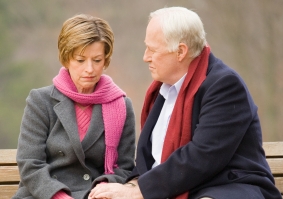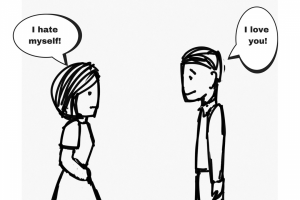Healthy Relationships Matter More Than We Think
 We know that good relationships are so important to our happiness, yet we may not know just how vital they are to our health and well-being.
We know that good relationships are so important to our happiness, yet we may not know just how vital they are to our health and well-being.
What do our connections to others give us? And what happens when we don’t have them?
The Vital Benefits of Good Relationships
Research shows that good relationships help people live longer, deal with stress better, have healthier habits, and have stronger resistance to colds. In a 2010 review of 148 studies, researchers found that social relationships improve lifespans. People in healthy long-term relationships are 50% less likely to die prematurely than people without them. In terms of life expectancy, living without these relationships is as unhealthy as smoking!
Humans are social beings – and the quality of our relationships affects our mental, emotional and physical health.
As researcher and author Brené Brown explains, “A deep sense of love and belonging is an irreducible need of all men, women, and children. We are biologically, cognitively, physically, and spiritually wired to love, to be loved, and to belong.”
What Happens Without Good Relationships
Without healthy connection, the result is not simply a quieter, duller life. The outcome is much worse than that. “When these needs are not met, we don’t function as we were meant to,” Brown assures us. “We break. We fall apart. We grow numb. We ache. We hurt others. We get sick. There are certainly other causes of illness, numbness, and hurt, but the absence of love and belonging will always lead to suffering.”
This is not an exaggeration, a hunch, or an opinion. A landmark public health study, called the Adverse Childhood Experiences or ACEs Study, amazed the medical and psychotherapy community by revealing how significant the quality of our relationships are to our health and even social behavior, with overwhelming evidence.
The Shocking Impact of Adverse Childhood Experiences (ACE)
The CDC and Kaiser Permanente surveyed over 17,000 participants (a cross section of average Americans) between 1995-1997, and followed them for over 15 years. Researchers suspected that trauma in childhood was linked to adult conditions such as obesity. They designed the study to score how many ‘types’ of traumatic events (from a list of 10) participants had experienced as children.
What researchers found continues to shock people when they discover the numbers.
They found that the more ACEs, the higher the incidence of mental, emotional, and behavioral problems for participants in adulthood.
People with ACE scores of 4 or higher were:
- Twice as likely to smoke
- 12 times more likely to attempt suicide
- 7 times more likely to be alcoholic
- 10 times more likely to inject street drugs
(Source: The Adverse Childhood Experiences Study)
High ACE scores are linked with higher rates of violent behavior, failed marriages, depression and absences from work, reports Jane Ellen Stevens of Aces Too High.
It’s Likely Someone You Know Is Struggling
Another disturbing finding, which troubled the researchers and certainly saddens me, was finding how common high ACE scores are. Two in nine people studied had ACE scores of 3 or more; one in eight people had a score of 4 or more. Even so, they somehow managed to hold jobs with health coverage by Kaiser Permanente. But the cost of trauma in childhood became starkly obvious as they tried to cope as adults.
The ACEs study is so meaningful because it helps us understand how important healthy connections are. We need to hear each other and be there for each other in safe and secure ways. These connections, with a basis of securely attached relationships help us form the ability to regulate our behavior and emotions.
Because so many evidently grow up without clearly knowing what a secure bond is, it’s important to talk about it. Author and researcher Dr. Sue Johnson has dedicated her life to understanding healthy human attachment. She has a helpful acronym: healthy connection provides “Accessibility, warm Responsiveness, and a certain kind of Engagement …A.R.E. – as in ‘Are you there for me?’ ”
A good relationship is balanced and helps both people. Knowing we matter to someone “gives us strength – a sense that we can tolerate being vulnerable and deal with challenges,” explains Johnson.
How Good Relationships Benefit Health
What makes a relationship beneficial is the attunement between people who care about each other. In a healthy secure connection, two people are able to hear from each other and recognize their needs, and listen so that person feels understood, and can make sense of their inner world.
Likewise, when a person feels supported by a healthy relationship, there is a sense of safety. There is great security in knowing it is okay to share deeper needs, one’s self-doubts and concerns, without fear that the person you’re confiding in will shame you or make you feel bad for appearing weak (vulnerable?) or needing support.
Healthy relationships foster health (wellbeing?), because they help keep fear and anxiety in a more manageable or regulated emotional state. Unresolved distress, or emotional dysregulation, activates the fight-flight response. The long-term flood of stress hormones dampens the immune system and even our ability to think and learn – especially during childhood.
Healthy relationships bring compassion to that relationship space, which helps us regulate our emotions, calm our primal alarm systems and promote longer periods of health.
In healthy relationships, people learn that they can safely manage worries, fears, hopes and dreams. This capacity builds intimacy, closeness, and a sense of security that has a far-reaching impact.
Learning To Build Healthy Relationships
Does this mean that people with poor quality relationships are doomed to poor health? Not at all. It is never too late to begin to have a good relationship in your life.
So much of the work of therapy is about learning to have a relationship that helps build and teach safety, trusting a trustworthy or safe (reliable?) person, and learning to share your inner world and ask for help. Healthy connections in therapy allow us to learn that relationships can be safe!
Therapy provides just this safe relationship. The therapist works on building rapport, that sense of safety for attunement to take place. In good therapy, people learn they are able to build a relationship where they have a voice, and that their voice is heard.
Because I get to see this amazing journey happen for my clients, I can assure you that we can learn to love and form healthy connections as adults, even if we have struggled for a long time without them.
It is Never Too Late to Begin
Even if the world did not seem like a safe place as a child, you can change that today. You can be in charge of adding safe relationships to your life and allowing them to be your path to health now!
Healthy bonds enable us to calm the anxiety and fight-flight responses that are the legacy of trauma. When we have a relationship that is a safe haven, it means we do not need to face our fears alone – we can turn to each other for shared support, strength and joy.
It takes time to learn how to open up to others so that healthy relationships can form, but it can be done. You can build secure, safe attachments later at any time in your life. It’s never too late to begin.
More Resources
Articles
Loving a Trauma Survivor: Understanding Childhood Trauma’s Impact On Relationships by Robyn E. Brickel MA, LMFT
Uncomfortable With Compliments? Why Being Able to Take In Kind Words Is So Important by Robyn E. Brickel MA, LMFT
Books
Daring Greatly: How the Courage to Be Vulnerable Transforms the Way We Live, Love, Parent and Lead by Brené Brown
The Gifts of Imperfection: Let Go of Who You Think You’re Supposed to Be and Embrace Who You Are by Brené Brown
Hold Me Tight: Seven Conversations for a Lifetime of Love by Sue Johnson
Love Sense: The Revolutionary New Science of Romantic Relationships by Sue Johnson
Wired for Love: How Understanding Your Partner’s Brain and Attachment Style Can Help You Build a Secure Relationship by Stan Tatkin PsyD, MFT
Websites
Dr. Sue Johnson: Creating Connections, on the attachment bond and books and other resources for therapists
Brené Brown, PhD, Researcher, Storyteller , on her work studying power of vulnerability and courage
Centers for Disease Control and Prevention: Adverse Childhood Experiences (ACEs) [page]
Tags: adult attachment, attachment, childhood, childhood experiences, relationship attachment, relationship issues, relationship problems, relationships, secure attachment









Leave a Reply